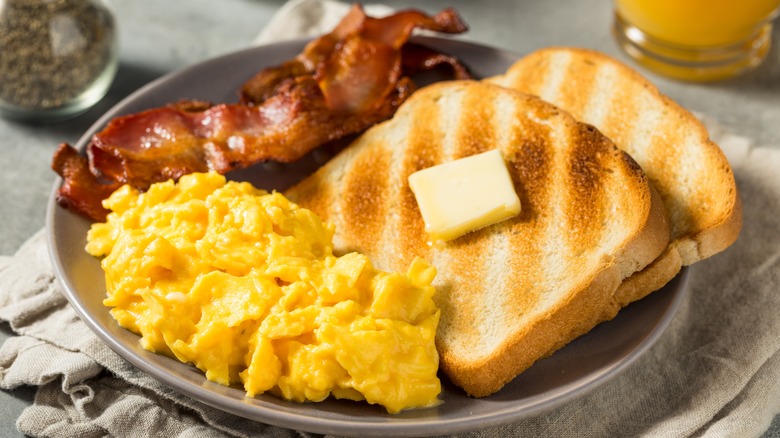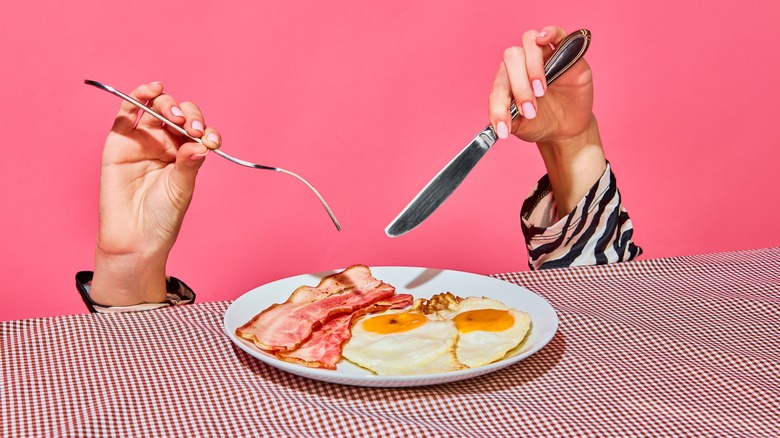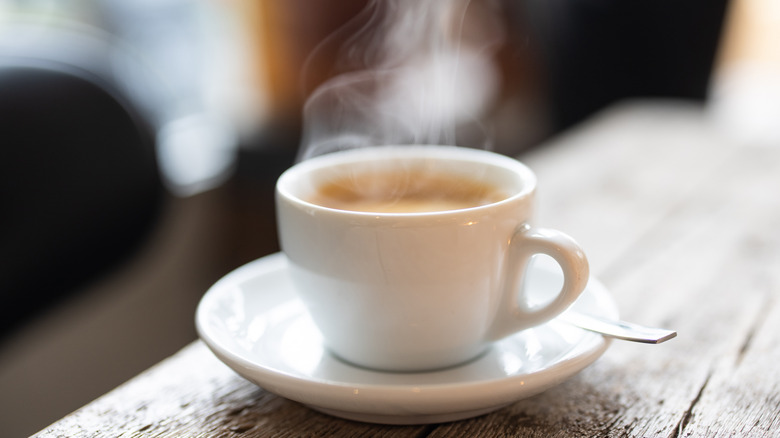The Origin Story Of The Modern-Day Breakfast
Our modern-day breakfast is a gift bestowed to us by both geography and history. Its parts originate from the light meal first eaten by ancient Romans upon waking, in a drink used to help 15th-century Yemeni Sufi monks' spirituality, on the rustic tables of English Tudor-period field hands, and in U.S. government research laboratories during the World War II. (For the purposes of this article, we'll be discussing the menu items of what most Americans would consider the canonical breakfast — bacon and eggs, toast, fruit, coffee, and orange juice — leaving out the myriad other delicious options like pancakes, waffles, oatmeal, grits, et cetera.)
The late-Latin word disieiunare — translated as un-fast — might be the conceptual etymological ancestor of breakfast, but ultimately transformed into the English word for dinner and the French word for lunch. The compound meaning "to break the fast" took a while longer: The Oxford English Dictionary places the earliest written use of the word breakfast to 1463; by the 16th century, it was widely used. Regardless, people need to eat soon after sleeping for several hours, and the foods associated with this meal have a fascinating history. Let's begin with the proteins.
Bacon and eggs
People have been salt-curing pork belly since time immemorial — and now we put bacon in almost everything – but bacoun, the word for a specific cut of meat from a specially bred pig, became not only the food's name but an English culinary tradition beginning in the Saxon era. Similarly, eggs have been a steady part of the human diet since chickens were domesticated, but the genius combination of bacon and eggs is credited to Tudor-period farm workers – although even that wasn't the first thing they ate, but rather a break-time meal after a few hours of predawn labor. Unsurprisingly, the upper class snubbed their noses at a meal of bacon and eggs, but that changed with time.
Eggs went mainstream in England about one hundred years later. "If any man desire a light nourishing, and comfortable breakfast," physician and medical writer Tobias Venner wrote in 1620, "I know none better then a couple of potched eggs, seasoned with a litle salt, and a few cornes of pepper..."
Toast, fruit, and coffee
Upon rising, ancient Romans ate a meal called ientaculum, a kind of breakfast bar featuring bread (or cake) with oil (or honey); fresh fruit such as apricots, plums, figs, as well as brined olives; cheeses; the occasional egg; and watered-down wine. Similarly, the Tudor breakfast wasn't complete without a slice of rustic bread made variously from rye, wheat, or oats. A glass of orange juice didn't become a breakfast staple until the mid-20th century after government scientists figured out how to make a good-tasting frozen juice concentrate during World War II to provide soldiers in the field with much-needed vitamin C. (Although it's recently fallen out of favor because of its comparatively enormous amounts of sugar, a glass of fresh orange juice will never go amiss.)
That leaves coffee, which not only enhances breakfast but occasionally substitutes for it. The word likely originates from the Arabic name qahwah, and the first person credited with roasting coffee beans and brewing the first cup is a certain Ali Ibn Umar al-Shadhili, a Sufi who lived in the Yemeni port of Mokha in the early 14th century. Around the same time, Sufi worshipers began brewing and drinking coffee to help them achieve a state of religious ecstasy; ultimately, coffee was deemed permissible for all Muslims to drink because, however stimulating, it was not intoxicating. So, remember your culinary ancestors the next time you make coffee at home and breakfast.


